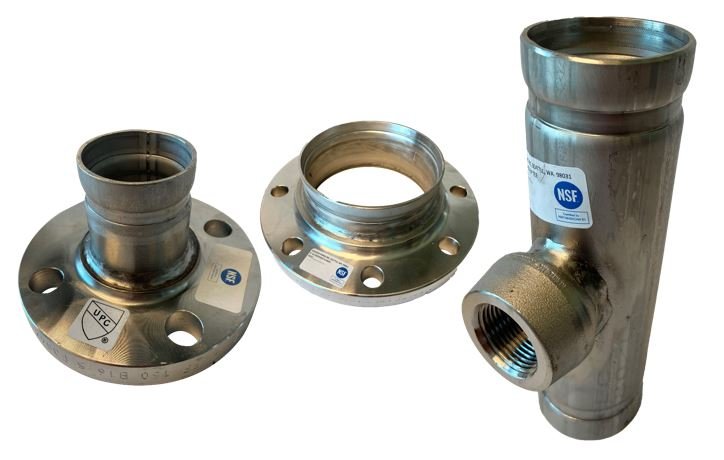HP Highlighted in Public Health of King Co. Article
Article Reposted From: Public Health Services of King County - Oct 19, 2023 - Reference below in the article (in orange) is Holaday-Parks, Inc.
Fabricated Stainless Steel Fittings and Assemblies - Allowed or Not?
By Dave Price, Assistant Chief Plumbing Inspector, Public Health - Seattle & King County
Many years ago, when the price of copper began to fluctuate wildly and often exceeded the cost of stainless steel, we started to see stainless steel being proposed for use as a material in domestic water piping systems. When stainless steel was officially added to UPC Table 6-4 in the 2009 cycle, there were still lingering questions about the fitting requirements for these systems. Up until the 2021 UPC, there were no Referenced Standards for stainless steel water distribution fittings listed within Table 6-4.
Some local contractors and fabrication shops realized they could fabricate their own stainless fittings at a lower cost than what could be purchased off-the-shelf. Noticing this trend, Public Health - Seattle & King County asked IAPMO directly if there were any applicable Standards that we could reference to inform the industry of specific manufacturing requirements for these types of fittings. All domestic water fittings regardless of material already had to meet the requirements of NSF 61 as noted in UPC Section 604.1. However, there were no manufacturing standards being applied to the actual fabrication of stainless steel fittings.
After discussions with the IAPMO Answers & Analysis committee, investigation of various fitting standards, and an in-depth reading of published NSF documentation, it was determined that these locally fabricated fittings and assemblies needed to be listed to both NSF 61 and IAPMO PS 53 (in the case of grooved fittings) in order to be considered UPC compliant. A publication issued by NSF clarified that a fitting constructed entirely of an Approved material (listed in Annex C of the NSF 61 Standard) could not be represented as certified to NSF 61 as had been the popular assumption at the time. That meant each type of fabricated fitting would need to be independently tested by NSF in order to be considered certified. Further, the IAPMO A&A Committee confirmed that when a thread-o-let, weld-o-let, flange, or similar appurtenance is welded to a piece of pipe, the resulting assembly becomes a ‘fitting’ and must be individually listed. These types of connections were considered by IAPMO to be different than a ‘welded joint’ which is prescriptively allowed per Section 605.13.2.
There is at least one local fabrication shop that has gone through the steps of obtaining the appropriate IAPMO and NSF listings for these types of fabricated assemblies. If your firm is interested in doing the same, you will need to reach out directly to NSF and IAPMO to inquire about the current process, including projected timelines and associated costs. You will need to submit a list of the fitting types you wish to have certified and send in samples to be lab-tested. When applying for NSF 61 certification, you will need to indicate if the fittings are intended to be used for cold water only, or for both cold and hot water (Commercial – 180° or Domestic – 140°). Certification will most likely include a visit of your manufacturing facility and ongoing annual recertification. Obtaining IAPMO PS 53 certification is a similar but separate process from NSF 61 certification.
When all of your fabricated assemblies have been tested and certified, you will receive authorization from both NSF and IAPMO to apply the NSF and IAPMO (UPC) symbols to your products (stickers or etchings). These are the markings our field inspectors will expect to see prior to signing off on a potable domestic water distribution system using these types of fittings. These listings will be periodically checked against the online IAPMO and NSF product listing websites to confirm the listing is active and appropriate to the use of the fitting.
Please note, the fitting listing requirement has been part of the UPC for many code cycles for all allowable materials within domestic water systems. Public Health’s current enforcement policy regarding fabricated stainless steel fittings and assemblies is not directly related to any specific code cycle or the adoption of future editions of the Plumbing Code. This enforcement policy has been in place for well over a year as a matter of ensuring public health. We are making a concerted effort to convey this information consistently and repeatedly to counteract rumors and misunderstanding surrounding this issue. If you have any remaining questions, please feel free to reach out via email to: planreviewinfo@kingcounty.gov and we will do our best to provide a thorough and personalized response.
Holaday-Parks is one of the largest full-service mechanical contractors in Washington and Alaska. We design, build, enhance, and service high-quality building solutions that are SMART—Sustainable, Measurable, Affordable, Reliable, and Timely. To learn more about how we can help with your next project, contact us HERE
